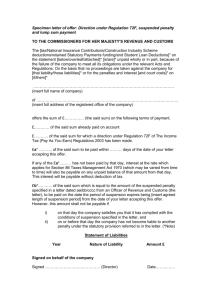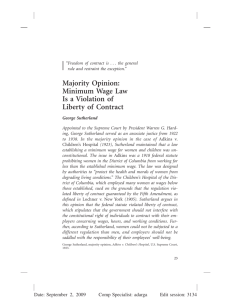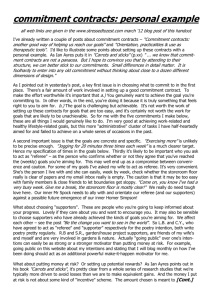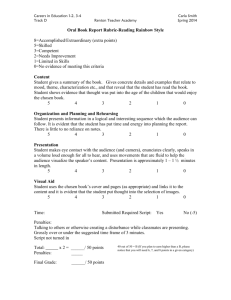Defending Taxpayer Penalties - Audit, Appeals and Litigation
advertisement
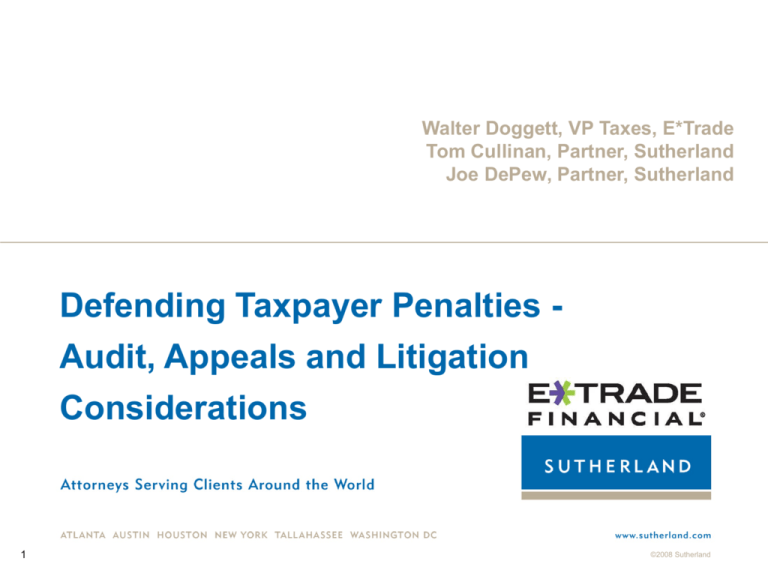
Walter Doggett, VP Taxes, E*Trade Tom Cullinan, Partner, Sutherland Joe DePew, Partner, Sutherland Defending Taxpayer Penalties Audit, Appeals and Litigation Considerations 1 ©2008 Sutherland Accuracy-Related Penalties Section 6662 • Negligence and disregard of rules or regulations (20%) • Substantial understatement (20%) • Substantial valuation misstatements (20%) • Gross valuation misstatements (40%) • Transactions lacking economic substance (20%) (for transactions entered into after 3/30/10) 40% if not disclosed • 2 Undisclosed foreign financial asset (40%) (for tax years beginning after 3/18/10) ©2008 Sutherland Accuracy-Related Penalties Section 6662A • Only for LTs/RTs • If not disclosed: 30% • If disclosed: 20% Section 6664(d) reasonable cause exception may be available • 3 Effective date: tax years ending after 10/22/04 ©2008 Sutherland Penalty on Refund Claims • Claim for refund or credit in “excessive amount” “Excessive amount” is the amount by which the claim for refund or credit for the tax year exceeds the amount of refund or credit allowable for the tax year No de minimus exception – would seem to apply to any and all claims Guidance under consideration • • • • 4 Penalty equals 20% of the amount Reasonable cause exception Ordering rule to coordinate with IRC §§ 6662, 6662A and 6663 Effective for claims filed or submitted after May 25, 2007 ©2008 Sutherland Policy Larry Langdon memo to LMSB (December 20, 2001) • “Examiners must consider the accuracy-related penalty under Section 6662 for underpayments attributable to a taxpayer’s participation in a listed transaction.” Commissioner Everson Memo to LMSB and SBSE (December 29, 2003) • 5 “The Service will not accept reliance on an opinion from a nonindependent tax advisor as proof of reasonable cause and good faith on the part of the taxpayer.” ©2008 Sutherland Policy Dave Robison Memo to Appeals (June 21, 2004) • 6 “The purpose of this memorandum is to establish a new policy for Appeals concerning the settlement of penalty issues. Effective immediately, we will no longer trade penalty issues in Appeals. Penalties can and should still be settled, but the settlement should be based on the merits and the hazards surrounding each penalty issue standing alone.” ©2008 Sutherland Policy Chief Counsel Notice 2004-036 (September 22, 2004) • “It is important that all Service functions coordinate the application of penalties so that: Examination employees consider, develop, and impose penalties where appropriate, with heightened scrutiny given to cases involving a listed transaction or a transaction that the Service has otherwise identified as potentially abusive; Appeals and Counsel resolve penalties based on their merits, including a hazards assessment and, finally, Counsel defends the penalty determination in litigation based on an analysis of the hazards of litigation for the penalty independent of the hazards of litigation for the underlying tax adjustments.” 7 ©2008 Sutherland Policy IRS Policy Statement 20-1 • 8 “In order to effectively use penalties to encourage compliant conduct, examiners and their managers must consider the applicability of penalties in each case, and fully develop the penalty issue when the initial consideration indicates that penalties should apply. That is, examiners and their managers must consider the elements of each potentially applicable penalty and then fully develop the facts to support the application of the penalty, or to establish that the penalty does not apply, when the initial consideration indicates that penalties should apply. Full development of the penalty issue is important for Appeals to sustain a penalty and for Counsel to successfully defend that penalty in litigation.” ©2008 Sutherland Implications of IRS Policy • Exam teams have less discretion • Emphasis on development E.g., IDRs targeted at penalties 9 • More penalties are raised in RARs • It may be harder to trade penalties at appeals • More litigation ©2008 Sutherland Defenses to Negligence and Disregard Penalties • Negligence – reasonable basis • Disregarding rules or regulations – 1. Adequate disclosure (and compliance with reportable transaction rules, if applicable) position contrary to regulation must also be good faith challenge to validity 2. • 10 Penalty does not apply to position contrary to revenue ruling or notice if it has a realistic possibility of being sustained on the merits (except for reportable transactions) All – reasonable cause under Section 6664 (plus adequate disclosure for position contrary to a regulation) ©2008 Sutherland Defenses to Substantial Understatement Penalty • Substantial Authority Objective inquiry Taxpayer has burden of proving substantial authority “Authority” is defined by Treas. Reg. Section 1.6662-4(d)(3)(iii) Authority inquiry made at the time return was filed Defense not applicable to tax shelters • Adequate Disclosure and Reasonable Basis Form 8275 and Form 8275-R Rev. Proc. 2006-48 Defense not applicable to tax shelters • 11 Reasonable Cause under Section 6664 ©2008 Sutherland Defenses to Valuation Misstatements, Economic Substance and Undisclosed Foreign Financial Assets • Valuation misstatements – reasonable cause and good faith exception “attributable to” – United States v. Woods, 134 S. Ct. 557 (2013) Special rule for charitable deduction property must have qualified appraisal made by Qualified Appraiser Special rule for net Section 482 transfer price adjustment 12 • Economic substance penalty – reasonable cause is not available • Foreign financial assets – reasonable cause and good faith exception ©2008 Sutherland Reasonable Cause and Good Faith Defense (Section 6664(c)) • Facts and circumstances test • Reliance on opinion or advice Advisor must be qualified Advice must be based on pertinent facts and circumstances No unreasonable assumptions Disclosure required where position is contrary to regulation • Failure to disclose RT is a “strong indication” taxpayer did not act in good faith • Special rules for corporate tax shelters Must have substantial authority and More likely than not belief Those are only minimum requirements, not dispositive 13 ©2008 Sutherland Reasonable Cause for Reportable Transactions (Section 6664(d)) • Protects against Section 6662A penalty for LTs and RTs, provided (not if lack ES) Adequate disclosure of relevant facts affecting asserted tax treatment Substantial authority for such treatment; and Reasonable belief that such treatment MLTN correct • Can’t rely on outside MLTN opinion if Disqualified opinion (“DTO”) or Disqualified tax advisor (“DTA”) 14 ©2008 Sutherland Disqualified Opinion (Section 6664(d)(3)(B)(iii)) 15 • Based on unreasonable factual or legal assumptions (including as to future events); • Unreasonably relies upon representations, statements, findings or agreements of the taxpayer or any other person; • Fails to identify and consider all relevant facts; or • Fails to meet any other opinion-related requirements prescribed by Treasury (i.e., Circular 230 standards) ©2008 Sutherland Disqualified Tax Advisor (Section 6664(d)(3)(B)(ii)) • A DTA is any tax advisor who Is a MA and participates in organization, management, promotion or sale of transaction; Is compensated directly or indirectly by a MA; Has a fee contingent on asserted tax benefits of transaction; or Has a “disqualifying financial interest” in the transaction • MA services in addition to giving tax opinion will generally trigger DTA status Clearly so if MA firm structures and/or documents transaction Even if retained only for tax work, tax advisor can’t suggest “material” modifications to structure or mechanics of transaction designed to assist taxpayer in achieving desired tax treatment [Notice 2005-12] Unreasonable limitation: may force client to retain separate counsel for tax planning and tax opinion work in order to assure penalty protection 16 ©2008 Sutherland Convincing the Audit Team 17 • History of compliance and cooperation • Nature of underlying transaction • Disclosure on return • Reliance on advisors • Written tax opinion • Elevate the discussion or broaden the audience ©2008 Sutherland Recent Developments with IDRs and Reasonable Cause • 18 Recent Examination IDRs from LB&I for penalty consideration asking for a statement that addresses reasonable cause for the assertion or non-assertion of the Section 6662 penalties for negligence or substantial understatement ©2008 Sutherland Appeals and Penalties • Impact of Appeals’ new AJAC Approach • Appeals’ discretion may depend on the underlying adjustment • Penalties no longer subject to “trading” Penalties must be evaluated on their own merit • New Issue guidance and penalties • Limited flexibility for Appeals Coordinated Issues, Emerging Issues, and Compliance Coordinated Issues Ascertain whether written (or unwritten) penalty guidelines exist Settlement possibilities may be limited 19 ©2008 Sutherland Privilege Issue in the Penalty Context • • AU Section 9326.22 Subject Matter Waiver FIN 48; United States v. Wells Fargo & Co., 2013 U.S. Dist. LEXIS 79814 (D. Minn. 2013) • 20 AD Investment 2000 Fund v. Comm’r., 142 T.C. No. 13 (April 16, 2014) ©2008 Sutherland In the Courts • 21 “When an accountant or attorney advises a taxpayer on a matter of tax law, such as whether a liability exists, it is reasonable for the taxpayer to rely on that advice. Most taxpayers are not competent to discern error in the substantive advice of an accountant or attorney. To require the taxpayer to challenge the attorney, to seek a “second opinion,” or to try to monitor counsel on the provisions of the Code himself would nullify the very purpose of seeking the advice of a presumed expert in the first place.” United States v. Boyle, 469 U.S. 241 (1985) ©2008 Sutherland Considerations for Litigation • Choice of forum Jurisdictional issues Precedent Discovery procedures Time and cost Settlement • Privilege waiver Bifurcate penalties from the merits? 22 ©2008 Sutherland Considerations for Litigation (contd.) • Will the advisor stand up? Concern about OPR, penalties, malpractice Fifth Amendment issues 23 • Use of experts • Choice of counsel ©2008 Sutherland Recent Cases • • • • • • • 24 United States v. Woods, 134 S. Ct. 557 (2013) Romanowski v. Comm’r, T.C. Memo 2013-55 Bemont Inv., LLC v. United States, 679 F.3d 339 (5th Cir. 2012) 106 Ltd. v. Comm’r , 684 F.3d 84 (DC Cir. 2012) aff’g 136 T.C. 67 (2011) Canal Corp. v. Comm’r, 135 T.C. 199 (2010) Salem Financial Inc. v. United States, 112 Fed. Cl. 543 (2013) Rawls Trading LP v. Commissioner, T.C. Memo 2012340 ©2008 Sutherland Special TEFRA Provisions 25 • Penalties and some penalty defenses must be raised in the entity-level proceeding • “Partner-level defenses” can only be asserted in a subsequent refund action • United States v. Woods, 134 S. Ct. 557 (2013) ©2008 Sutherland Practical Considerations Approach Penalties as a Separate Issue • Anticipate IRS arguments Result is too good to be true Advisor did not have all the facts (or the facts were inaccurate) Advisor is not independent The advice was untimely Cookie-cutter opinions • Consider advantages to briefing Exam separately on penalties Memorandum part of administrative file – may help at Appeals Opportunity to assess flexibility or lack thereof in asserting penalties with respect to proposed adjustment 26 ©2008 Sutherland Practical Consideration 27 • • • • • • • Get a written opinion • • • Don’t bury the transaction, and perhaps disclose it From a qualified tax advisor Who is independent Who does not assume away critical facts Give the advisor all of the relevant facts Get the opinion before you file the return Make sure the opinion addresses the issues and applies relevant law Pay the advisor by the hour Do not mark opinion “privileged” ©2008 Sutherland


